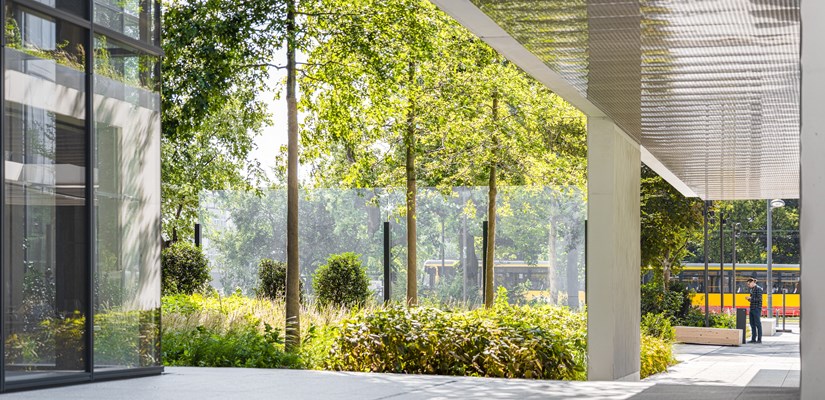
In addition to theoretical content, the publication by Responsible Business Forum also contains concrete examples of sustainable activities of companies that are members of the Forum’s Partnership Programme. Prepared jointly by Elżbieta Rotblum and dr Agnieszka Koryś-Matusiak, the article 'Choice of office property and implementation of a sustainable development strategy' present a case study based on the PZU Park office building at Daszyńskiego roundabout in Warsaw (developed by Skanska), which is home to the headquarters of the largest insurance company in Poland and Central and Eastern Europe.
The article describes, among others, the criteria adopted by the tenant in selecting its new premises. The choice of these criteria was influenced by an awareness of the impact commercial real estate may have on the environment and the wellbeing of the people working in office space.
The authors looked at office property from 4 perspectives: environmental impact, human impact, ethical standards and the company's ESG strategy. This approach makes it possible to show the spectrum of solutions applied at PZU Park, which not only enable carbon footprint reduction or responsible resource management, but also support employee health and well-being. The four perspectives also help mark the essence of the challenges and opportunities the office development industry is facing.
- Just a few years ago, the choice of property for an office was mainly determined by good location, modern design or the budget available to the company. Today, when real estate increasingly functions in the minds of organizations as an element that can support or hinder the implementation of their sustainability strategies, environmental and social impact and ethical aspects are also becoming important decision-making factors - notes Elżbieta Rotblum.
- The last few years have seen environmental protection entering the mainstream of public debate, becoming the subject of interest not only in the media, but also in civic society, especially among young people, and the subject of an increasing number of regulations as well. The voice of the silent stakeholder is thus becoming louder and louder, not least because of horrific natural disasters. (...) Environmental measures are gaining due recognition as both crucial and profitable. Companies are already looking for knowledge on how to run projects in a new way, rather than arguments supporting the thesis that environmental management is an investment that, if undertaken early enough, supports an organisation's growth. And knowledge can enable them to better prepare for legal changes and, at the same time, the effects of progressing climate change,' wrote Marzena Strzelczak, General Director of the Responsible Business Forum, and Agnieszka Kłopotowska, Responsible Business Forum project manager, coordinating the Chapter Zero Poland programme, in the introduction to the publication.
Full publication can be found here (available in Polish):
Wspólna odpowiedzialność. Rola zarządzania środowiskowego – PDF_PL